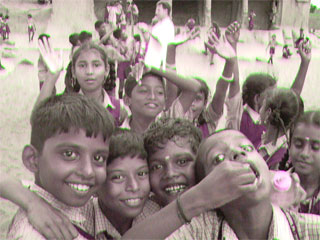Semester at Sea Fall
2006 Voyage 
- Home Page
- My bio
- Multisited Ethnography Project
- Shipboard Interview with LR
- The Hawaiian Tour Guide
- A Rushed Day in Tokyo
- Yuen Long, Hong Kong
- Ben Trahn Market, Ho Chi Minh City
- A Typical Cultural Tour in Myanmar
- The Gaze of an Indian Boy
- Egyptian Students at the Pyramids
- Taksim Square, Istanbul
- Open Letter
The Gaze of an Indian Boy
By Wren Chan

-Kids with a future ahead of them which is different from the one I met-
Upon getting off the auto rickshaw, my companions and I were approached by a child who held out his hands in the gesture for money. His clothes were quite worn and he was walking barefooted. His mother was nearby trying to get money from some Semester at Sea students that were approaching us. She was wearing a worn out purple sari and walking barefoot like her son. Though they didn’t speak a word, they both held their hands to us as if in anticipation that as “rich” tourists, we could give them money.
We were let off by the driver at the driveway of a silk shop which I found suspicious as if hinting that the driver wanted us to go in so that he could obtain a commission for bringing us there. The sidewalk itself was in bad condition with trees spaced out somewhat evenly and the sidewalk either dirt or cracked concrete. Sudharak Olwe’s photo ethnography, Not a Pretty Picture, on the dangers and the financial situation faced by Mumbai’s street workers, makes me wonder how much dirtier the streets are underground if it is this bad on the surface. It had just rained earlier in the morning thus even with my shoes on a feeling of uneasiness gripped me over the dirtiness of the sidewalk.
The boy followed us as we did our best to not make eye contact since we were told by the interport (guest) lecturer that if we give them money, even more will flock towards us. There were chances that the woman and the child were working for someone else who would take their money after we give it to them and it would teach the child that he could make money even if he didn’t work. These thoughts flashed through my minds as I tried to justify doing other Indians were doing; which is considering the woman and child to be invisible We crossed the wet and dirty street leaving the woman and the child behind. Upon completing the journey across the street, I turned my head back and took a brief glimpse of his eyes and that memory is still vivid. His eyes spoke of betrayal or abandonment by us. In the end I attempted to justify what I had done by reasoning that if the child were to hate me, he would have the drive to move on in life. Part of me disagreed, knowing clearly that there would not likely be social mobility for the child if he spent all his time out begging for money.
I imagined at that point that the boy perhaps looked at me as peculiar since I may be one of the few Asians that he had encountered. To him, I was different, lighter skinned but nonetheless I would be rich comparatively to him thus he would hold his hands out for money. Perhaps I had an air of authority to me since I was taller than the boy and he would look up and have his hands extended upwards towards me as we walked down the sidewalk. It may have bothered him that we didn’t make much eye contact with him, didn’t bother acknowledging his existence. But then again, he might have received this treatment from others whether wealthier Indians or other tourists. Maybe he envied my shoes and noticed my apparent disgust in walking in the dirty sidewalk and wondered why I cared about it even with the protective covering of my shoes. Did the boy know what he was doing or was he just following instructions?
From his point of view it becomes more apparent that he was at the mercy of others since everyone else were much larger than he is. From his point of view, perhaps we were supposed to be a potential catch to scam some money, or people without a sense of charity. He might have noticed that as I turned my head around, my eyes showed conflict and regret that I may have abandoned him to the fate that he was born into. Perhaps he may have seen these eyes many times before and grown immune to the conflict, pity and regret cast by these eyes. This shot/reverse-shot, held by the spell of a mutual gaze, gives us the different perspectives of an event that had occurred between the identities that we held: the rich and the poor, the foreigner and the native, the young adult and the child. From reflecting on this gaze I learned that the hype about India’s growing information technology sector and emerging middle class is just an illusion when even children have to beg for money on a street that is in disrepair.